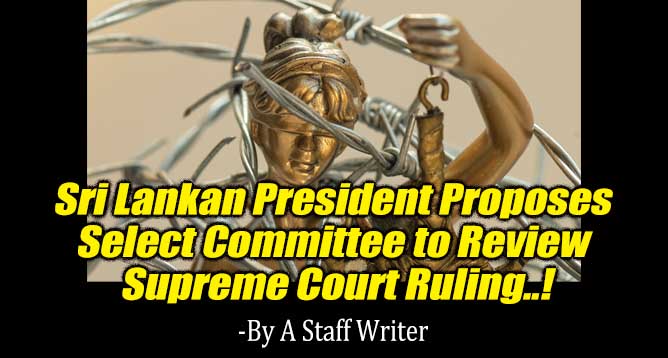-By A Staff Writer

(Lanka-e-News -20.June.2024, 11.00 PM) In a bold move, President Ranil Wickremesinghe has proposed the appointment of a parliamentary select committee to examine a recent Supreme Court judgment, accusing the apex court of engaging in "judicial cannibalism." The Supreme Court had ruled that the proposed 'Gender Equality' Bill is inconsistent with Article 12 of the Constitution.
The Gender Equality Bill, aimed at ensuring equal opportunities for all irrespective of sex or gender identity, has stirred significant controversy in Sri Lanka, a Buddhist-majority nation of 22 million people. The bill's opponents argued that it would permit same-sex marriages, challenging the cultural norms of various communities.
"The top court has ignored a certain section which the Gender Equality Bill has addressed. It has eaten up all the judgments, including one delivered by a bench of ten judges regarding women's rights. It has engaged in judicial cannibalism. The court has also ignored an amendment to the penal code by the Chief Justice,” President Wickremesinghe stated, expressing his discontent with the ruling.
The President highlighted that the court's determination also impacts the Priven Education Bill, emphasizing that he does not intend to summon judges before Parliament. Instead, he proposed appointing a majority of members from the Parliamentary Women's Caucus to the select committee.
The Supreme Court's three-member bench had ruled that a two-thirds parliamentary majority and a referendum would be necessary to adopt the Gender Equality Bill without amendments to its contentious clauses. The court deemed allowing same-sex marriages as both constitutionally and culturally inappropriate.
President Wickremesinghe's remarks have sparked concerns among international investors and observers about the stability of Sri Lanka's legal and political environment. Critics argue that the President's actions could undermine the independence of the judiciary, potentially affecting the country's democratic fabric.
Despite the Supreme Court's ruling, President Wickremesinghe has faced criticism for appointing officials, including the Inspector General of Police, who had been faulted by the court. Additionally, the President's controversial history, including accusations of involvement in torture and killings during the "Batalanda" period, has resurfaced, raising questions about his commitment to judicial integrity.
The potential bypassing of the Supreme Court's decision on the Gender Equality Bill by a parliamentary committee has been described by critics as a threat to the independence of the judiciary and the end of Sri Lankan democracy. Such actions, they warn, could set a dangerous precedent, eroding the rule of law and democratic governance in the country.
Reflecting on global trends, the undermining of judicial independence by populist political leaders poses a significant threat to democracy. Former British Prime Minister Margaret Thatcher once noted that the rule of law is fundamental to traditional liberties. Undermining legal rights and the judiciary is often a precursor to tyranny.
As Sri Lanka navigates this contentious issue, the actions of its leaders will be closely watched both domestically and internationally. The preservation of judicial independence and democratic principles remains crucial for the nation's future stability and prosperity.
---------------------------
by (2024-06-20 18:26:09)
Leave a Reply